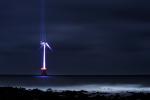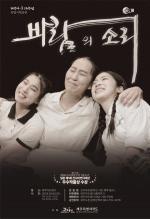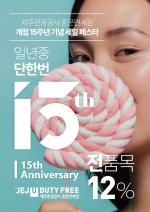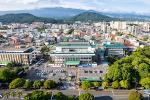- Dispatch 5 from the 6th Jeju Forum for Peace & Prosperity, May 27-29
article_right_top
The Jeju Weekly currently has reporters at the forum venue covering a wide range of talks, sessions and panels. We will be posting brief reports on our Web site throughout the weekend, and then compile them into a comprehensive report for Issue 51 of The Weekly as well as in our Chinese edition. -- Ed.
The opening ceremony for the 6th Jeju Forum for Peace & Prosperity was a mixture of hopes for the future, worries over a nuclear North Korea, and of China trying to abate fears of what its rapid development could mean and ensure that its progress will help to further improve Asia’s economy.
On May 28, the Haevichi Hotel & Resort’s Grand Ballroom was almost filled to capacity. After a frenetic performance by Nanta, a popular Korean non-verbal drumming theatrical show, Jeju Governor Woo Keun Min was the first to speak at the opening ceremony.
“During the last 10 years the center of the economy has been shifting towards Asia,” said Woo, and that this trend is only going to continue. “The standard of Asia will become the de facto standard of the world.”
Woo went on to say that the World Economic Forum was born in Davos, Switzerland and that he hopes the Jeju Forum will become Asia’s equivalent, a place to discuss the establishment of peace.
East Asia Foundation Chairman Gong Ro Myung, the second to speak, echoed Woo’s expectations.
“The [forum], with the aim of meeting the demands of this time of change and re-establishing itself as a more comprehensive forum in Asia provides a stage for dialogue and communication on diverse ideas and opinions in broader fields than ever before.”
He continued that this gathering of intellectuals from various fields and world leaders is an opportunity “to enhance mutual trust and collective wisdom to further peace and prosperity in East Asia.”
Korean Prime Minister Kim Hwang Sik then took to the stage and said, like the others before him had, that Asia was on the rise, but continued and reminded the audience that “In reality, many problems lie ahead.”
He made a call for a denuclearized North Korea for the country “disrupts peace in the entire region.”
This threat to Asia’s stability, he continued, is only compounded by the arms race currently underway.
“The area of Asia must be an era of hope,” he said stating that along with the development, there is an economic gap where there are some who make $30,000 a year and there are still those in the region who live on less than a dollar a day.
“We must continue our efforts to promote democracy and human rights,” said Gong.
Zhao Qi Zheng, director of the Foreign Affairs Committee of the Chinese People’s Political Party Consultative Conference remarked that this notion of China becoming the new economic center of the world was a rather romantic idea, but “It is a very realistic topic that we should address.”
He stressed the notion of quality over quantity and China is dependent on foreign investments for growth, and the country is currently working on improving social welfare, health care and education.
Zhao directly addressed China’s position in relation to a North Korea, specifically Kim Jong Il’s visit last week, saying they have a “very firm approach,” and understand that it is a critical issue affecting the peace of East Asia. He said that the dialogue his country has with North Korea, based on their history and on support, is better than antagonism when it comes to persuasion.
“I ask for your continued trust in the Chinese country,” said Zhao, and that there are those worry about China becoming too powerful in Asia, but he does not agree with this, because of as he mentioned earlier in his speech, the geopolitical position of the country, bordered by several nations, they have a particular responsibility to fulfill.
He ended his speech by saying that he had no doubt that the forum will become a global venue.
The final speaker during the opening ceremony was former Philippines President Gloria Arroyo spoke of the “Asian Century” which will see rise making poverty marginalized and the marginalized becoming that of the middle class.
She said that “we have much to learn from China” and that its economic growth is an opportunity for the region, which her country, the Philippines has directly felt the effects of and their relationship has become more “confident,” because of it, and that ultimately “we can say that rising China is more an opportunity than a threat.”
The other opportunity she addressed was the “eventual” reunification of the Korean peninsula, but until that happens denuclearization is “key to attaining long term peace, progress and stability throughout our region.”
She sympathized with the plight of the Korea people speaking of when her father “authored and sponsored … to send troops to Korea,” and in the Korean War “we both shed blood and sacrificed lives for a common dream of freedom.” This remark received applause from the crowd.
She concluded that “I am with a hope that the people of the Republic of Korea and the people of the Philippines continue to join hands and continue building upon our gains toward the Asia of peace and prosperity.”
Darryl Coote darrylcoote@jejuweekly.com
<저작권자 © 제주위클리 무단전재 및 재배포금지>






